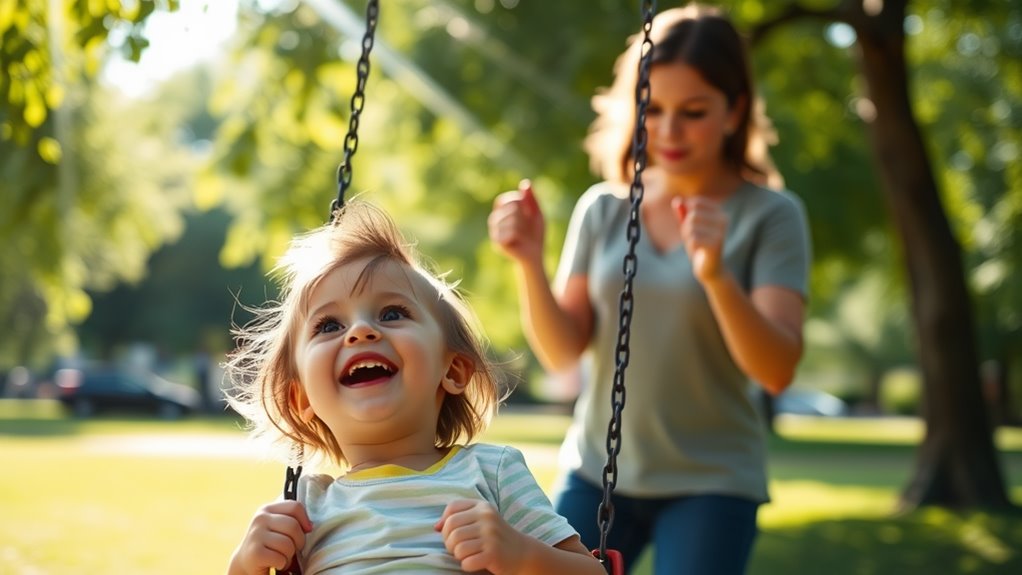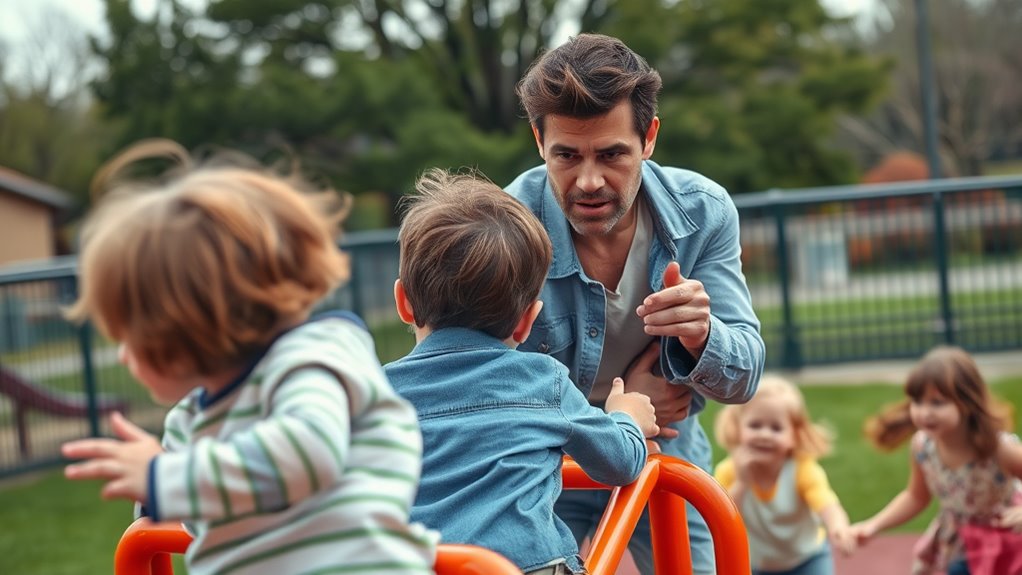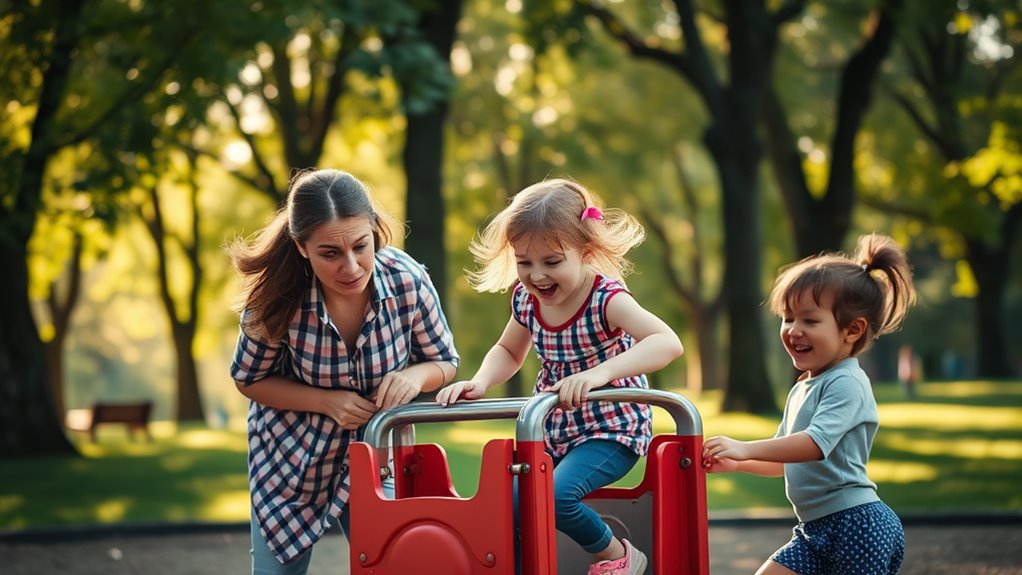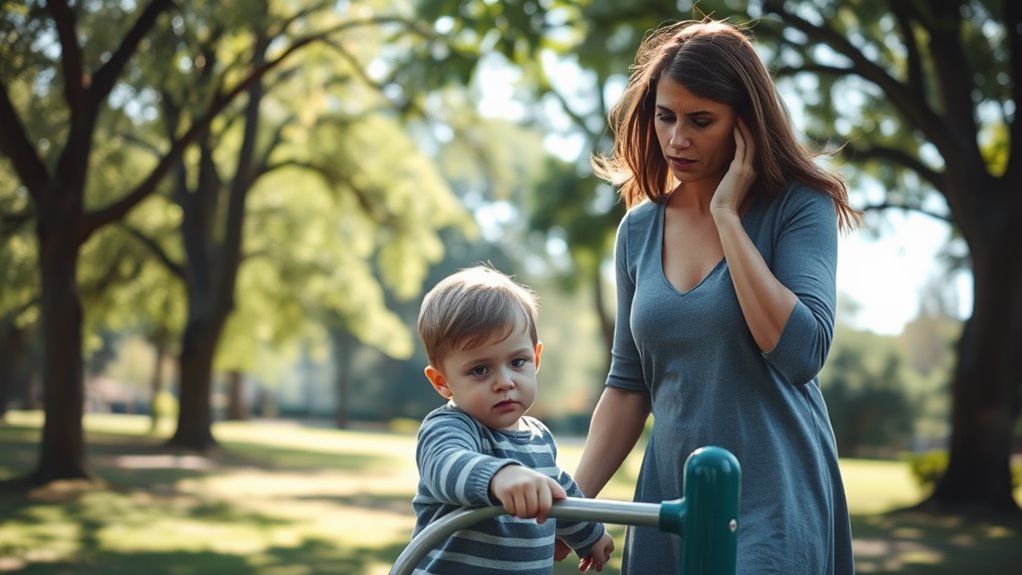Understanding Helicopter Parenting and Its Impact on Children
Helicopter parenting involves being overly involved in your child’s life, often controlling their decisions and actions. While this may come from a desire to help, it can actually hinder their independence and growth. Children of helicopter parents often struggle with anxiety, lack of confidence, and issues in social situations. They may find it hard to cope with challenges due to limited problem-solving skills. To foster better development, it’s important to encourage your child’s independence and open communication. Balancing support with freedom is key, allowing your child to learn from both successes and failures. There’s so much more to explore, so keep going!
Definition of Helicopter Parenting

Many parents might find themselves engaging in what’s known as helicopter parenting, a term that describes a style of overly involved and controlling behavior. This approach often leads you to hover over your kids, keeping a close watch on their activities, decisions, and friendships.
You might feel it’s your job to guide every choice they make, believing that this will lead to their success and happiness.
Helicopter parenting can manifest in various ways, such as constantly checking in on your child’s homework or intervening in their social conflicts. You may think that stepping in will protect them from failure or disappointment, but it can sometimes have the opposite effect.
By being overly involved, you may unintentionally hinder their ability to develop important life skills, like problem-solving and independence.
It’s important to recognize that while your intentions are often rooted in love and care, allowing your child to experience challenges and setbacks is essential for their growth.
Striking a balance between support and independence can help them build confidence and resilience, preparing them for the future.
Understanding this definition of helicopter parenting is the first step toward fostering a healthier relationship with your child.
Characteristics of Helicopter Parents

While you might believe that being heavily involved in your child’s life is beneficial, helicopter parents often exhibit specific characteristics that can hinder their child’s development.
One notable trait is their tendency to control every aspect of their child’s life. They might micromanage school projects, hover during social events, or even dictate extracurricular activities, leaving little room for their child to make independent choices.
Another characteristic is their excessive worry about their child’s safety and success. Helicopter parents often rush in to solve problems, preventing kids from learning to tackle challenges on their own. This can create a dependency that stifles growth and self-confidence.
Additionally, helicopter parents frequently prioritize their child’s achievements over their well-being. They may push their kids to excel academically or athletically, often overlooking the importance of balance and personal interests.
Lastly, helicopter parents usually have difficulty stepping back, even as their children grow older. They may struggle to allow their teens to take the lead in decision-making, which can hinder their ability to navigate adulthood.
Recognizing these traits is the first step in fostering healthier relationships and promoting independence in your child.
Emotional Impact on Children

The emotional impact of helicopter parenting can be profound and long-lasting. When parents constantly hover over their children, it can create feelings of anxiety and insecurity. You might struggle to make decisions on your own, fearing failure or disappointing your parents. This constant pressure can lead to stress, which can affect your overall well-being.
Additionally, helicopter parenting can stunt your emotional growth. If you’re used to having every problem solved for you, you may find it hard to cope with challenges later in life. You might feel overwhelmed when faced with situations that require independence or resilience. This can lead to a lack of self-confidence, making it difficult to trust your abilities.
Moreover, the emotional bond between you and your parents can become strained. If you feel smothered or controlled, you may start to resent their involvement in your life. This resentment can affect your relationship, making open communication challenging.
Ultimately, it’s crucial to find a balance. While parental support is important, giving you space to grow and learn from your mistakes can foster healthier emotional development and stronger family connections.
Social Development Challenges

Helicopter parenting often creates significant social development challenges for children. When you hover over your child, trying to protect them from every little issue, they might miss out on learning essential social skills.
For example, if you always intervene during conflicts, your child might struggle to resolve disagreements independently. They may feel unsure about how to communicate effectively with peers, which can lead to feelings of anxiety in social situations.
Additionally, children raised under such scrutiny often have trouble making decisions on their own. With parents making choices for them, they may not develop the confidence needed to navigate friendships or group dynamics.
This lack of experience can lead to social awkwardness, as they mightn’t know how to initiate conversations or engage in cooperative play.
Moreover, helicopter parenting can limit opportunities for children to face challenges and learn resilience. When they don’t encounter difficulties, they miss the chance to develop problem-solving skills.
In the long run, this can affect their ability to form meaningful relationships and adapt to new environments. Ultimately, fostering independence and allowing your child to tackle social situations can help them grow into confident, capable individuals.
Strategies for Balanced Parenting

To achieve a healthy balance in parenting, it’s crucial to step back and allow your child to experience life on their own terms.
Encourage independence by giving them age-appropriate responsibilities. This not only builds confidence but also teaches valuable life skills. For instance, let them manage their homework or choose their extracurricular activities.
You should also practice open communication. Ask your child about their feelings and opinions, and listen without judgment. This fosters trust and shows them that their voice matters.
Another strategy is to set boundaries while allowing freedom within those limits. Establish rules that are clear, yet flexible, so your child can learn to make choices and face the consequences, both good and bad.
Lastly, model balanced behavior yourself. Share your own experiences and how you handle challenges.
When your child sees you embracing both successes and failures, they’ll understand that life is about the journey, not just the destination.




